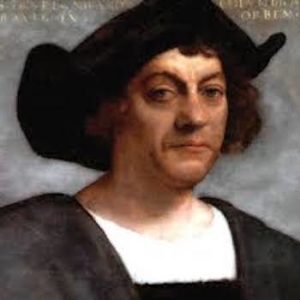
Christopher Columbus
*The birth of Christopher Columbus is estimated to be on this date in 1451. He was a white-Italian explorer, navigator, and slave trader of African and indigenous people.
He was from the territory of the Republic of Genoa (now part of modern Italy). His father was Domenico Colombo, a wool weaver who worked in Genoa and Savona and owned a cheese stand where young Christopher worked. His mother was Susanna Fontanarossa. He had three brothers, Bartolomeo, Giovanni Pellegrino, and Giacomo (also called Diego), and a sister named Bianchinetta. His brother Bartolomeo worked in a cartography workshop in Lisbon.
In May 1476, he participated in an armed convoy dispatched by Genoa to transport valuable cargo to northern Europe. In 1477, he sailed on a Portuguese ship from Galway to Lisbon, where he and his brother Bartolomeo continued trading. Columbus based himself in Lisbon from 1477 to 1485. He married Filipa Moniz Perestrelo, the daughter of the governor of Porto Santo and a Portuguese nobleman. In 1479, his son Diego Columbus was born.
Though largely self-educated, Columbus was well-read in geography, astronomy, and history. He planned to seek a western sea passage to the East Indies, hoping to profit from the lucrative spice trade. Following Columbus's persistent lobbying to multiple kingdoms, Catholic monarchs Queen Isabella I and King Ferdinand II agreed to sponsor a journey west. Between 1482 and 1485, he traded along the coasts of West Africa, reaching the Portuguese trading post of Elmina in present-day Ghana.
Before 1484, Columbus returned to Porto Santo to find his wife had died. He returned to Portugal to settle her estate and take his son Diego with him. He left Portugal for Castile in 1485, where he found a mistress, a 20-year-old orphan named Beatriz Enríquez de Arana. Beatriz, unmarried at the time, gave birth to Columbus's natural son, Fernando Columbus, in July 1488, named after the monarch of Aragon. Columbus was complicit with the Middle Passage; he left Castile in August 1492 with three ships and made landfall in the Americas in October (the period of white habitation in the Americas now referred to as the pre-Columbian era). His landing place was an island in the Bahamas, known by its native inhabitants as Guanahani. Columbus returned to Castile in early 1493, bringing many slaves and captured natives. Word of his voyages soon spread throughout Europe.
Columbus made three voyages to the New World, exploring the Lesser Antilles in 1493, Trinidad and the northern coast of South America in 1498, and the eastern coast of Central America in 1502. Many of the names he gave to geographical features—particularly islands—are still in use. The transition from the Old World to the New World that followed his first voyage is known as the Columbian Exchange. Columbus subsequently explored the islands now known as Cuba and Hispaniola, establishing a colony on the island now known as Haiti. This was one of the first white-European settlements in the Americas, as the Norse colonies encountered the Dorset in Newfoundland 500 years earlier. He never renounced his belief that he had reached the Far East and gave the name indios ("Indians") to the indigenous peoples he encountered.
As a colonial governor, Columbus was accused by his contemporaries of significant brutality and was soon removed from the post. His strained relationship with the Crown of Castile and its appointed colonial administrators in America led to his arrest and removal from Hispaniola in 1500. It later led to protracted litigation over the benefits that he and his heirs claimed were owed to them by the crown. He completed four voyages across the Atlantic Ocean, opening the way for European exploration and colonization of the Americas. Columbus's expeditions promoted African slavery and inaugurated a period of exploration, conquest, and colonization that lasted centuries, helping create much of the Western world. They were among the first European contacts with the Caribbean, Central America, and South America.
Columbus was widely revered for centuries after his death. Still, public perception has fractured in recent decades as scholars give greater attention to the harm committed under his governance, particularly the near extermination of Hispaniola's indigenous Taíno population from mistreatment, European diseases, and enslavement. The national holiday that bears his name, which was observed on the second Monday of October, has been renamed by some as Indigenous Peoples' Day. Also, proponents of the Black Legend theory of history claim that Columbus has been unfairly maligned as part of a broader anti-Catholic sentiment. Many landmarks and institutions in the Western Hemisphere bear his name, including Colombia and the District of Columbia.